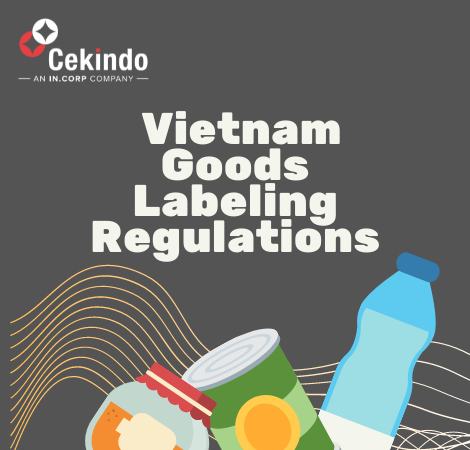As importers or exporters, it is essential to stay updated on any new laws or amendments. The most recent update on Goods Labeling in Vietnam is the Decree No. 111/2021/ND-CP, issued on December 9th, 2021, guiding on amendments to some articles of Decree No. 43/2017/ND-CP that was issued in 2017. The Decree lays down the contents, ways of presentation, and state management for labels of imported and exported goods in Vietnam. It takes effect from 15th February 2022.
Read more to see how these amendments impact the goods labeling process in Vietnam.
Want to enter Vietnam market with your products? See Cekindo’s Product Registration Services
What are the requirements for goods labeling in Vietnam?
To be sold in the country, the label of goods must display the following information inVietnamese
- Name of goods;
- Contact information of the organizations and people that are responsible for the goods;
- The origin of goods;
- Other compulsory information also has to be shown on the label in accordance with the characteristics of the goods specified in Appendix I, which is issued with this Decree and relevant regulations.
E.g.: For commodities, the mandatory contents are quantity, production date, expiration date, and warning information (if any).
If the goods are imported and the original label is written in a foreign language, the importer shall add the Vietnamese labels containing all required information after the Customs Clearance Procedure is completed.
As part of Customs Clearance Procedures, goods imported into Vietnam must display the following contents in foreign languages or Vietnamese:
- Name of goods;
- The origin of goods;
- Full name or abbreviated name of the foreign country’s manufacturer or entity in charge of the goods;
- Full name and address of the importer.
In case the label does not show the full name or the address of the manufacturing entity or the responsible entity of the goods, all the information listed above must be presented in the documents attached with the goods.
Regulations Regarding Goods with Unidentified Origin
Following the decree, manufacturers, importers, and exporters must identify and show the origin of their goods and ensure precision and compliance with laws regarding the origin of exports, imports, and domestically manufactured goods or any trade agreements to which Vietnam is a signatory. However, if the source of goods cannot be determined, the label must mention the location of the final stage of the process.
Furthermore, if the final stage to finish goods is completed in a country or territory other than the country or region of the assembling, the place where the finishing stage takes place shall be described with one of, or a combination of, the following phrases: assembled in, bottled in, mixed in, finished in, packed in or labeled in.
RELATED: A Comprehensive Guide to Importing to Vietnam
What Does the Law State for Labeling Healthcare Equipment
For the goods classified as medical equipment, it states that the equipment must include the name and address of the owner and the circulation number holder. Medical equipment without a circulation number must have its owner’s name along with the name and address of the organization or individual that is shown on the import license.
What are the goods that are exempt from this Decree?
This Decree does not apply to the following goods:
- Real estate;
- Goods temporarily imported for re-export; goods in transit; transshipped goods; goods in trans-shipment; imported goods consigned to bonded warehouses for re-export to a third country;
- Entry and exit luggage; personal belongings
- Confiscated goods for auction;
- Fresh, raw food or processed food that is sold straight to customers without packaging;
- Unpackaged fuel, raw resources (agricultural and marine goods and minerals), trash (from industry and business), and construction materials supplied directly to customers;
- Petro, oil and gas (LPG, CNG, LNG), liquid without packaging in containers or tankers;
- Used goods;
- Goods to serve public security purposes; radioactive substances; goods for emergency cases such as natural disasters, diseases; railway, waterway and airway means of transport.
How Can Cekindo Help?
A Product Registration procedure in Vietnam can be very time-consuming and complex due to a lot of regulations that get updated regularly. To avoid any penalties or unfortunate losses, Cekindo’s professional and dedicated team guarantee to help clients stay compliant with the laws. From registering your company to getting an import license, fill in the form below to get a hassle-free experience with us!
